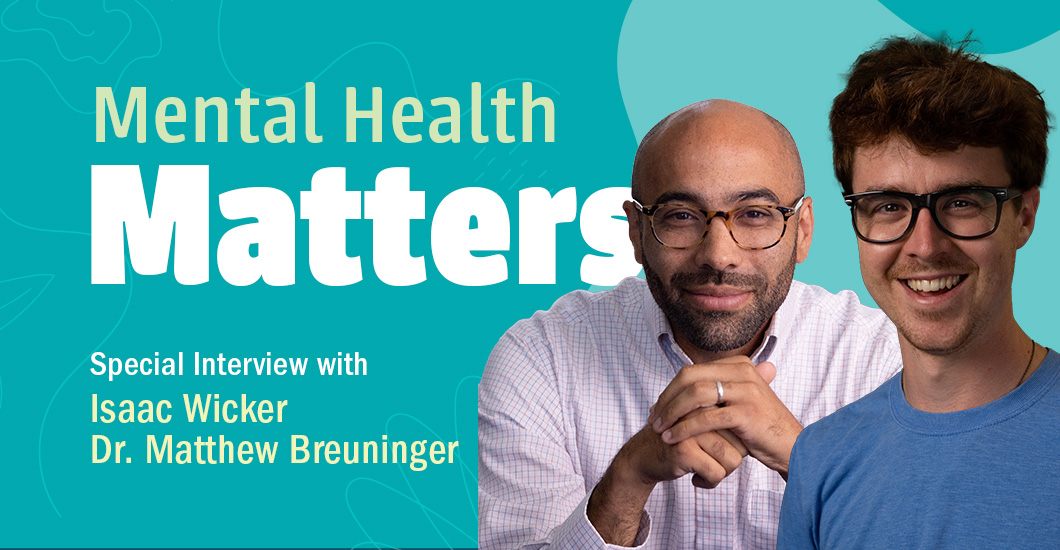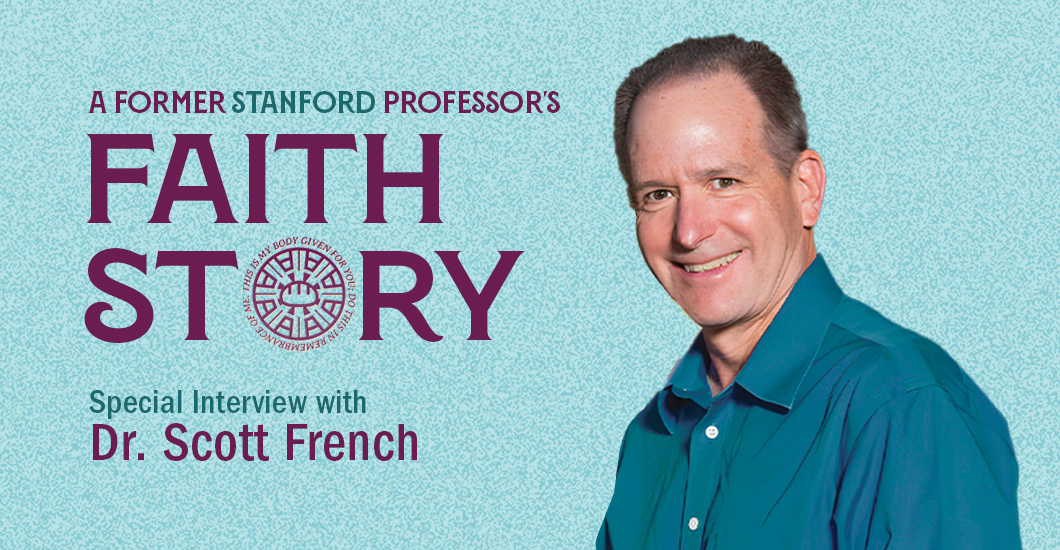Recent Interviews
Mental Health Matters
If you are struggling with a mental illness, or if a dear one is valiantly fighting through one, this is a must-read.
I came across one of Dr. Matthew Breuninger’s talks in 2020, at the height of the pandemic, when I was personally moving through a time of deep personal turmoil. His take on healing deeply touched me back then, so when I chanced upon Project KNOWN recently, my interest was instinctively piqued. Isaac Wicker’s blog posts and personal mission had an inspiring intention and determination, so there was no hesitation in getting in touch with these two amazing souls. Isaac and Matt are both mental health professionals who have found an amazing way to bring their faith and profession together, through their project KNOWN. Both of them have their own stories of finding and losing touch with God, but at the core, their journeys are about asking questions, searching for the truth, and arriving at the Father’s Loving Heart.
Getting to know them has been a blessing and here is an excerpt of the enlightening conversation I had with them.
Q. So, both of you have had your share of struggles. From experience and professional practice, do you think it’s true, the idea that having a mental health issue equals not being good enough in faith?
Isaac: I’ve heard that from many people, even wrestled with that myself. I don’t have a super good answer for this, but I think the fundamental question is not about ‘faith or no faith’. Instead, a shift in perspective might actually help all of us.
Truth is, we’re all broken, really broken. Faith gives us a place where we can say this out loud with freedom: “I’m broken. I need to be held and loved. I need to start again.” We need to be seen in all our brokenness and messiness, and we need to be loved there. This idea that my brokenness shows that I’m not strong enough in my faith is so misleading.
Honestly, my faith isn’t good enough, but that’s okay. I’ll keep going to God with my insufficient faith, my anxiety, my brokenness…all that mess. My faith does need to be stronger, but what if the way that I pray—connect to God—is by taking care of myself in a new and better way, by practicing skills that will help me get there?
Matt: To tell someone: “have more faith” is to misunderstand what faith is because we don’t give ourselves faith. Faith is a gift from above. It’s really easy to say: “just believe that you are the beloved of God.” But growing up, if you had the repeated experience of your parents not meeting your needs, that sense of worthlessness gets wired into your neurobiology. So, a random “Hey, you’re valuable” simply is not enough.
What is beautiful about God is, He doesn’t ask us to get rid of our feelings. He says: “Pick up your cross and follow me.” So sometimes, my mental illness is my cross, and I follow Him in my sadness. We’re going to feel the spectrum of human feelings, and we’re going to feel stuck sometimes. But when we just say: “God, I’m anxious. I’ve never done this before.” I think God, the Father goes: “Of course you are.”
When I was teaching my little daughter to ride a bicycle, she’d tell me: “Daddy, I’m scared.” I’d tell her: “Of course, you are, baby. You’ve never ridden a bike before. You’re going to fall and get hurt. But I’m here. I get being afraid. You’ll learn to not be afraid by doing it.” I don’t chide her with: “Don’t you trust me?” God is like that with us, infinitely compassionate.
Q. Is it challenging to bring your Catholic faith into psychological practice? Most times, it feels that both fields just don’t mix well…
Isaac: I think it’s helpful actually when faith and psychology come together. The Catholic faith is so good at giving us a clear idea of who we are—we are made by God and for God. I think that’s a big part of who a person is, someone with infinite dignity.
A therapist’s job is so often to search out that infinite dignity within you, and then reflect it back to you. That’s what I do with clients who are not of the faith. Having been able to experience God’s love for me, having the experience of Him searching out my dignity and showing it to me—that becomes the path I follow also with those who come to me. It’s within that mercy, love, and connection that we can all be called into something greater. My faith is such a foundation of hope, redemption, and renewal that I can’t imagine a wholesome practice without it.
Matt: The honest truth is that psychology can be really hostile to faith and its principles, but in the light of my practice, it seems to me that none of us are actually rejecting God. We reject people who oppressed, bullied, or made us feel little; we even reject the distorted ideas of God that we received, but we never really reject God. So, my aim in therapy is to help clear away the human, natural elements that block us from seeing God as He wants to reveal Himself to us.
I view my job as being the hands, eyes, and feet of Christ, so one thing I try to do is just sit with people the way God would—be a mouthpiece, a visual…How would Christ respond if you told Him something difficult, painful, shameful, or immoral?
I can feel profound compassion for you, convey a deep fundamental truth about who you are and how God sees you, without ever using the word ‘God.’ Aren’t we all much more likely to be moved and shaped by words when there’s a deep relationship of trust, love, and security? And when we feel that, we actually listen with open hearts. So contrary to being a challenge, my faith actually informs and aids my practice in profound ways.
I had a client who had done in-vitro fertilization, who was afraid that, as a Catholic, I’d disapprove. By this point, we’d been through some deep and vulnerable places and I told him that I’d love to hold and even kiss his baby. I don’t think IVF is a moral good, but simultaneously, I can love him and be happy for him. I can hold those two things. I think that expression is often very healing for all of us.
Q. So, KNOWN is an attempt to bring these two fields together, in harmony. Can you explain the project in a nutshell?
Matt: For many of us, it’s really hard to fathom or imagine a God who could love us when we make mistakes because every time we made a mistake, our parents communicated to us disappointment, embarrassment, and shame. They would often tell us: “I’ll be warm and affectionate again, once you change.” It’s really hard, I think, as a parent, to communicate love, even in the midst of correcting your child, to tell: “I love you and want you, and I want to stay connected to you even though what you did was wrong.”
KNOWN, the title, is so powerful for me because it communicates this deep desire of the human heart—to be “known” and not to be afraid that if you saw me, you would leave me. I think this is the core of the whole project—the Father’s Heart knows all of us, embraces us, and draws us in. He looks past our defects, faults, and failings, and grasps that inner beauty. We all want that, right? This feeling of being known and still being loved. KNOWN is trying to tell you that you have it already—in the Father.
Isaac: KNOWN is a 12-week program for the deep healing of places of identity—relearning the Father’s identity as loving, and through His love, relearning our individual identity as a beloved son or daughter. We go into places of those deep wounds where the distortions about our identity are the strongest and allow the Father’s light and love into those places. Then, we journey more into a place of freedom, lightness, childhood, and playfulness.
The overall arc of the journey is learning to be really honest with what your heart says about God. Setting our theology aside for a little bit, and having our hearts speak: “I actually feel this way, Father. I feel really insecure, small, and abandoned, and You actually seem harsh, distant, and controlling.” To actually speak those things, and then follow those feelings down to what makes us so suspicious or insecure with the Father and heal those past hurts. The whole journey is about allowing the Father, through honesty, to show us something new.
We do it together as a group. Each person has their own individual journey, and we try to facilitate the process. We aren’t responsible for the healing; the healing happens between each participant individually and God the Father.
Q. I’ve heard so many say that mental illness makes it so difficult to pray. How can one get over that hurdle?
Isaac: In KNOWN, we invite you to an ‘honest’ prayer. Three nights a week, we have a living silence routine—turning off all technology from 7pm to 7am, then turning off all electric lights and going into candlelight at 9pm. In this silence, we invite you to be really honest.
We’re asking you to just simplify even your language with God. What is your heart honestly feeling? “Father, I’m scared. I’m excited. I’m nervous. I’m anxious. I’m hurt.” Simply telling Him those things instead of trying to condemn parts of yourself for not being ‘saintly’ enough, that truly helps.
It’s not prescriptive prayer; it’s getting to the cry of the heart and directing it towards the Father. Let the Father hear that cry. Often, when people feel stuck, I ask them to spend the next week telling God how angry they are. Trying to have pious, holy praise of God, when actually, our hearts are just super angry, is not going to work. That’s often how we invite people to pray—in this very relational, simple cry of the heart.
Matt: That’s what the Father is like—a DAD. As a dad, I want to know when my kids are angry, sad, or anxious, even when they’re angry at me. When my daughter wants something and I tell her no, she stomps her foot and says: “Dad, I’m angry at you.” But my daughter’s anger doesn’t scare or hurt me. I feel bad for her, and it draws my compassion, but it doesn’t anger me.
God is perfect! My anger doesn’t disrupt His perfection. When I say: “God, I am angry at you,” it draws His compassion like a good father. Since God doesn’t have an ego like some of us dads, that is the prayer we would invite you to—being honestly open to God.
————————————————————-
Are you struggling with a mental health issue? Here are some tips from Matt and Isaac.
1. Bring your heart to the Father
When you struggle to pray, freely share your anxiety, fear, frustration, and overwhelm with the Father. Bring honesty into your relationship with God and let Him see and know your heart as it is. Hold nothing back from Him.
2. Find comforting images from Scripture that allow you to feel seen and known
Find something to anchor yourself on—maybe a line from a prayer, a Bible verse, an imaginary visual of you with Jesus or the Father…Find it, and especially in your times of deep turmoil, return to that space of serenity and grasp onto it dearly.
3. Find (and offer) fellowship
We are made in the image of a God who is a communion of persons. None of us can do this alone. When I am struggling, there is this group of guys I run to, whose faith and love often helps me. This convinces me that I’m not alone. We need people who look at us and love us when we can’t love ourselves.
It’s important to have at least one person that you can tell almost everything to—the shameful parts, the hard parts, the confusing parts; not to give you good advice or to try and fix you, but to stay with you while you’re vulnerable, intercede for you, believe for you until you can rediscover your true worth.
4. Allow others to help you carry your cross (Jesus did!)
Many people I talk to are really worried about being a burden on others. We’re so afraid I think, especially these days, about burdening others with our emotions or needs. But it’s okay to need help. It’s okay to be a burden. That’s where Church comes to life, when we all start walking together.
Dearest Father, into Your Heart, I entrust my broken life…Enable me to find my way back to You, and allow me to feel Your lasting embrace.

Maria Teres Sebastian is a passionate young writer who aspires to spend her time and skills for the glory of God. She lives in Kerala, India.
Want to be in the loop?
Get the latest updates from Tidings!




